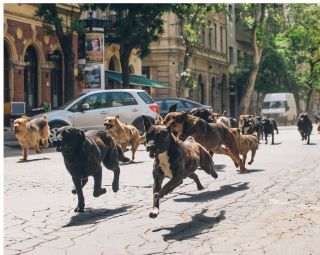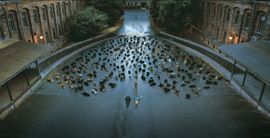Sleep
What Happens When the Dogs Strike Back
In "White God" dogs rise up against the people who have abused and killed them.
Posted September 3, 2015
The other night I watched "White God" ("Fehér Isten"), Hungarian director Kornel Mundraczó’s allegorical film about the revolt of street dogs against the oppressive rule of people. The citizens of this dystopic state, that physically resembles Budapest, express their fealty for noxious notions of racial purity through their continuing pogrom against the mutts among them. Only state recognized pure Hungarian breeds, as classified in an official registry, are fit to live with people. Any person harboring a mutt must pay a prohibitive licensing fee or have the dog confiscated and killed. It is a wonderful world wherein if you dislike your neighbors’ dog, you need only call animal control and identify it as a mutt in order to inflict major pain on them. [I watched "White God" on a live-stream from Netflix, but the film is also available on DVD and other formats.]
Ostensibly, the film recounts the trials and travails of 13-year-old Lili, Hagen — her mixed breed dog and best companion — and Daniel, her dog-hating father, who is in the process of retiring from his job as a meat inspector instructor. Lili’s mother is leaving her with her father for three months while she goes off to Australia with her new partner. No one has told Daniel that his daughter comes with a dog — a mutt he immediately dislikes. Ratted out by a neighbor, who falsely claims she was bitten by the dog, Daniel, receives a threatening visit from animal control and is told to pay the licensing fee or watch the dog be seized and hauled off to die. At this point, the clever viewer might ask why Lili’s mother and stepfather never apparently had to pay the fee. But it is a testament to the film’s power and pacing that even if asked, the question is soon swept aside by events, and the stellar performances of several hundred dogs.

The film begins in medias res with a shot of an unidentified girl pedaling her bicycle on a deserted street pursued by an army of angry dogs which overtakes her, leaving us to imagine, wrongly, what has happened. We are then transported back a few days into the past, to Lili’s meeting with her father, when he learns that she comes with Hagen. That is not a deal he had bargained for and their relationship immediately deteriorates.
Hagen — played through most of the film by Bodie, with able relief from his brother Luke — is a big powerful dog, who resembles a Caucasus sheepdog. He takes up life on the street after Lili’s father Daniel dumps him from the car far from their apartment. Hagen is soon after expelled from Lili's bedroom, where he is accustomed to sleeping. Having fled her father’s apartment that morning, Lili soon learns that a big dog is hard to hide.
Daniel hauls Hagen from the car on the way home from the music academy, despite Lili’s protests. Abandoned, Hagen first tries to follow the car but is soon lost, alone and is just barely able to cross a dangerous highway. The scene in which Hagen learns how to cross a street safely is marvelously touching, as is his meeting with a small, streetwise terrier who on more than one occasion saves Hagen with her savvy.
Indeed, the dogs are more marvelous actors than the humans in this film. In fact Bodie and his brother Luke, who share the role of Hagen, were awarded the Palm Dog at the 2014 Cannes Film Festival.
After Hagen is dumped on to the street, the film cuts back and forth between Lili searching for Hagen and Hagen seeking Lili. Hagen joins a group of street dogs that is raided by animal control. He escapes into the protection of a street person, who then betrays him by selling him to a dog fighter.
Hagen’s situation becomes unbearably bleak. His new master is a pure sadist who brutalizes his body and soul in an effort to turn him into a vicious killer and force him to turn to his abuser for food and shelter.
By this point in the film, I was reminded of Jack London — specifically the fictinal Buck and his descent to and return from hell in "The Call of the Wild." Here, as in London’s novel, redemption comes not through submission, but through rebellion and a terrible, swift vengeance.
I don’t want to spoil a fine film by giving away too many details, but I will say that Hagen’s first dog fight was his last and that in leading a rebellion of street dogs, he exacts a bloody toll on the humans who have wronged him, including those with animal control, like the woman who heads the “shelter’ where unwanted dogs are killed. Only Lili’s father, Daniel, who has a conversion experience near the film’s end, is spared.
The film ends almost literally on a high note, as Hagen is led back from the abyss by the sound of Lili’s trumpet. In the poster for the film features a shot of Lili and Daniel prostrate before Hagen and his pack, who lie calmly before them. But the sound I hear over the music is that of a human voice saying to Daniel as he goes out to lie by his daughter: ”Shall I call the police?” He replies, “Give them a little more time.”

The appropriate disclaimers at the film’s end assure viewers that no animals were harmed in making the movie, but even if staged, several scenes are vile enough to cause distress. The film is not so brilliant that I would urge anyone to lay aside their distaste even for staged animal cruelty, but if you would like to see dogs strike back at bad people, however pyrrhic the victory — it is worth watching.




